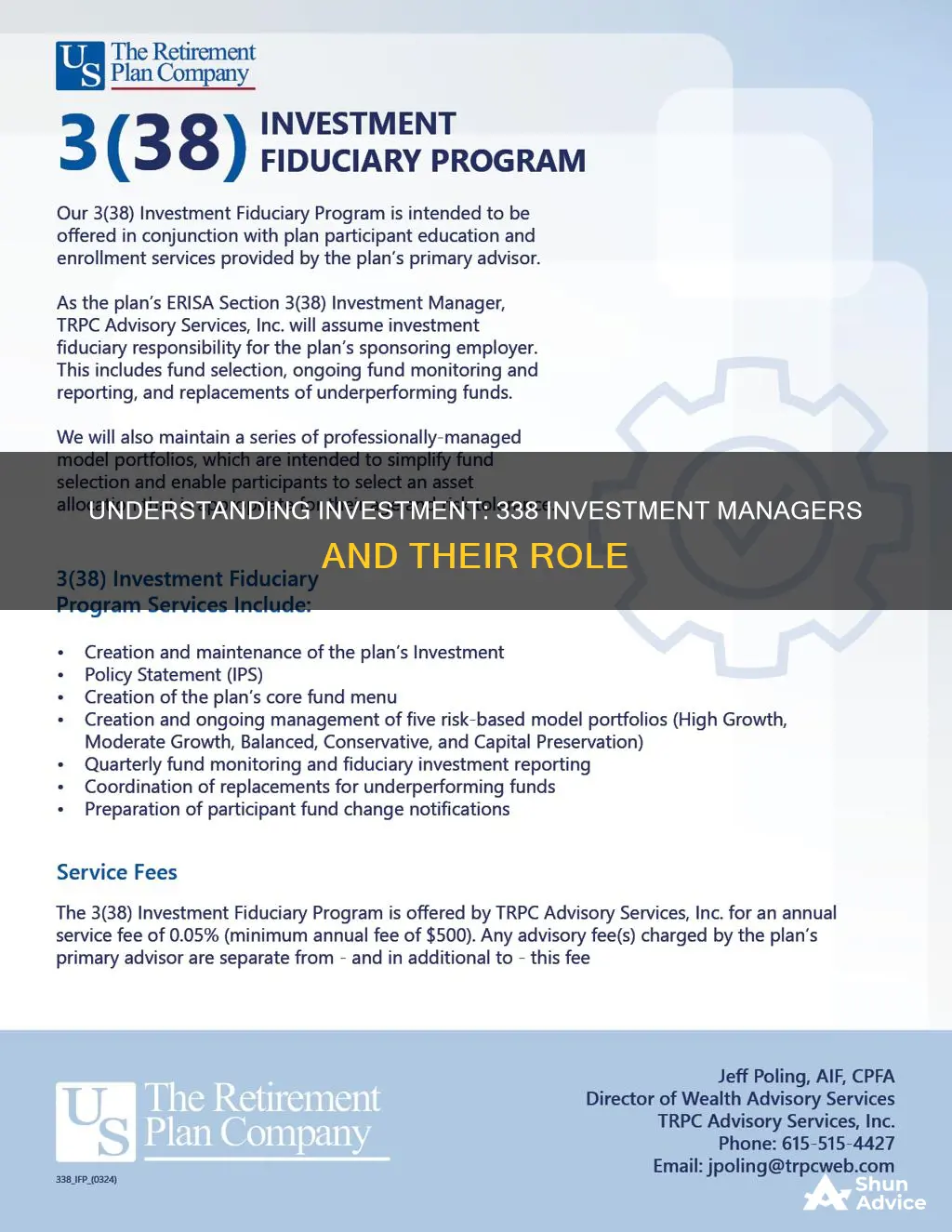
A 3(38) investment manager is a codified investment fiduciary on a retirement plan as defined by ERISA (the Employee Retirement Income Security Act) section 3(38). They are responsible for selecting, managing, monitoring, and benchmarking the investment offerings of the plan. A 3(38) investment manager can be a way for employers to limit 401(k) investment liability and reduce the risk of litigation.
| Characteristics | Values |
|---|---|
| Definition | A codified investment fiduciary on a retirement plan as defined by ERISA section 3(38) |
| Role | Responsible for selecting, managing, monitoring, and benchmarking the investment offerings of the plan |
| Responsibility | Create and manage an Investment Policy Statement, form an Investment Committee, hold investment committee meetings, select plan investment options, report on investments regularly, benchmark investments, replace funds and update models as needed |
| Benefits | Reduces the cost, risk, and work associated with sponsoring an employee retirement plan |
| Outsourcing | Must be outsourced to an RIA firm, bank, or insurance company |
| Fiduciary Responsibility | Assumes sole fiduciary liability for investment selection and monitoring |
| Appointment | Appointed by the plan sponsor |
| Discretionary Responsibility | Has discretionary responsibility to direct, choose, dispose of, and make investment decisions |
| Suitability | For plan sponsors who don't have the time or want to be responsible for the plan's investments |
| ERISA Qualifications | More important than investment experience or past performance |
What You'll Learn
- A 3(38) investment manager is a codified investment fiduciary on a retirement plan defined by ERISA
- They are responsible for selecting, managing, monitoring, and benchmarking the investment offerings of the plan and may have discretionary authority
- They must be a registered investment advisor, bank, or insurance company by law
- They can be hired to reduce an employer's work and cost on a 401(k) plan and mitigate risk
- They are one of three types of fiduciaries that businesses can hire

A 3(38) investment manager is a codified investment fiduciary on a retirement plan defined by ERISA
A 3(38) investment manager is a codified investment fiduciary on a retirement plan defined by the Employee Retirement Income Security Act of 1974 (ERISA). This means that a 3(38) investment manager is an expert who has been delegated the responsibility and liability of making investment decisions for a retirement plan. The retirement plans in question are often 401(k) plans, but 3(38) investment managers are also used for other defined contribution plans, such as 403(b) plans.
The name "3(38)" comes from the relevant section of ERISA that defines this type of arrangement. Under a 3(38) arrangement, the burden of investment decision-making and risk is outsourced to a qualified expert. These experts are fiduciaries, which means they are legally required to act in their clients' best interests when choosing funds and managing assets.
A 3(38) fiduciary can only be a bank, an insurance company, or a registered investment advisor (RIA) subject to the Investment Advisers Act of 1940. The plan sponsor signs over authority to the 3(38) fiduciary to make all investment decisions and the fiduciary assumes legal responsibility and liability for those decisions. It is important to note that the plan sponsor cannot completely eliminate their fiduciary liability, as they are still responsible for the prudent selection and monitoring of the 3(38) investment manager.
One of the main benefits of hiring a 3(38) investment manager is risk mitigation. By outsourcing investment decisions to an expert, plan sponsors can reduce their liability for poor investment selection and monitoring. This is especially relevant in the context of recent high-profile lawsuits alleging that employers violated their fiduciary duty to prudently select and monitor investment options in their retirement plans.
Another advantage of using a 3(38) investment manager is time savings. By delegating investment responsibilities, plan sponsors can free up time to focus on other aspects of their business or, in the case of smaller companies, reclaim time that was previously spent on investment management. This can also lead to faster fund changes, resulting in improved retirement outcomes for employees.
Overall, engaging a 3(38) investment manager can provide plan sponsors with peace of mind, knowing that investment decisions are being made by experts and that they have reduced their fiduciary risk.
Saving and Investing: Pros, Cons, and Your Money
You may want to see also

They are responsible for selecting, managing, monitoring, and benchmarking the investment offerings of the plan and may have discretionary authority
A 3(38) Investment Manager is a codified investment fiduciary on a retirement plan as defined by ERISA section 3(38). They are responsible for selecting, managing, monitoring, and benchmarking the investment offerings of the plan. In some plans, they also have discretionary authority to direct the investment of funds.
The 3(38) Investment Manager is responsible for the selection, monitoring, and replacement of investment options as needed. They will often act as a plan consultant by helping to manage other providers, as well as providing financial education. They are also responsible for creating and managing an Investment Policy Statement, forming an Investment Committee, holding investment committee meetings,section 3(38) of ERISA grants them discretionary controls of the plan's assets. This means they can select, monitor and replace investments for the plan. They have the authority to make those decisions on behalf of the client.
A 3(38) Investment Manager is appointed by the plan sponsor to manage investments and has discretionary responsibilities. They assume a complete investment fiduciary stance as recognised by ERISA. They must acknowledge this status in writing and have a written agreement with the plan sponsor. The 3(38) Investment Manager is one of three primary fiduciary roles. Overall, outsourcing fiduciary roles can reduce the cost, risk, and work associated with sponsoring an employee retirement plan.
The 3(38) Investment Manager role is best suited for plan sponsors who do not have the time or desire to be responsible for the plan's investments. They are responsible for making financial decisions, but the plan sponsor must still ensure the manager fulfils their obligations.
Investing: The Smart Way to Grow Your Money
You may want to see also

They must be a registered investment advisor, bank, or insurance company by law
A 3(38) investment manager is a codified investment fiduciary on a retirement plan as defined by ERISA section 3(38). The 3(38) investment manager is responsible for selecting, managing, monitoring, and benchmarking the investment offerings of the plan. They are also responsible for the selection, monitoring, and replacement of investment options as needed.
The 3(38) investment manager assumes fiduciary responsibility from the named fiduciary, who is usually the employer or an officer of the employer, such as the CEO, COO, or CFO. The 3(38) investment manager must be a registered investment advisor (RIA) under federal or state law, a bank, or an insurance company. This is because they have been granted authorization to act as a fiduciary on behalf of the plan and its participants and must have the requisite understanding of retirement plan rules to meet their fiduciary obligations.
A 3(38) investment manager can be appointed by the plan sponsor to manage investments and has discretionary responsibilities. They will often act as a plan consultant by helping to manage other providers and provide financial education. The plan sponsor must still ensure the 3(38) investment manager fulfils their obligations, and this includes carefully selecting and monitoring the 3(38) investment manager.
The benefits of a 3(38) investment manager include the sharing or transfer of fiduciary responsibility, which can reduce the risk of litigation and financial loss for the plan sponsor. It also allows the plan sponsor to focus on their business, safe in the knowledge that their employees have access to professional investment advice.
A Guide to Investing in Managed Funds
You may want to see also

They can be hired to reduce an employer's work and cost on a 401(k) plan and mitigate risk
A 3(38) investment manager is a codified investment fiduciary on a retirement plan as defined by ERISA section 3(38). They are responsible for selecting, managing, monitoring, and benchmarking the investment offerings of the plan.
Hiring a 3(38) investment manager can help reduce an employer's work and cost on a 401(k) plan and mitigate risk. Firstly, a 3(38) investment manager can take on the majority of investment responsibilities, lifting this burden from the employer. The manager has discretionary controls of the plan's assets, meaning they can select, monitor, and replace investments without needing approval from the employer. This saves the employer time and effort in making these decisions and allows them to focus on their core business activities.
Secondly, a 3(38) investment manager can help reduce costs associated with the 401(k) plan. They ensure that investment lineups are cost-effective, prudent, diversified, and competitive. The cost of hiring a 3(38) investment manager can be easily offset by the savings obtained on investments.
Thirdly, a 3(38) investment manager can help mitigate risk and reduce the potential for litigation. In recent years, there have been several lawsuits alleging that employers violated their fiduciary duty to prudently select and monitor investment options in their 401(k) plans. By outsourcing this responsibility to a 3(38) investment manager, employers can reduce their liability and mitigate the risk of costly lawsuits.
Overall, hiring a 3(38) investment manager can provide significant benefits to employers, including reduced workload, cost savings, and mitigated risk.
Savings Accounts: Invest or Save?
You may want to see also

They are one of three types of fiduciaries that businesses can hire
A 3(38) investment manager is a codified investment fiduciary on a retirement plan as defined by ERISA (the Employee Retirement Income Security Act of 1974) section 3(38). They are one of three types of fiduciaries that businesses can hire. The other two are consultants and investment advisors.
A fiduciary is a person who acts on behalf of another to manage financial assets. Fiduciaries are bound by law to act in another person's best interests, offering unbiased advice and demonstrating a high level of ethics when making financial decisions. A 3(38) investment manager is responsible for selecting, managing, monitoring, and benchmarking the investment offerings of a retirement plan. They have discretionary controls of the plan's assets, meaning they can select, monitor, and replace investments without needing approval from the client.
The other two types of fiduciaries that businesses can hire are consultants and investment advisors. Consultants have no fiduciary liability for investment recommendations. They help to mitigate risk by demonstrating that plan sponsors have contributed to a deliberative process, but the plan sponsor retains full fiduciary responsibility. Investment advisors, also known as ERISA 3(21) investment advisors, assume co-fiduciary liability. They have a fiduciary responsibility to deliver prudent investment advice consistent with ERISA's fiduciary standards, but the plan sponsor retains ultimate decision-making power over plan assets.
A 3(38) investment manager differs from the other two types of fiduciaries in that they have sole fiduciary liability for investment selection and monitoring. They are appointed by the plan sponsor to manage investments and have discretionary responsibilities. They are responsible for the selection, monitoring, and replacement of investment options as needed. They are also the only type of fiduciary that can make investment decisions on behalf of the client.
Hiring a 3(38) investment manager is, therefore, the best way for businesses to reduce their fiduciary liability and give their employees access to professional investment advice.
Who Runs Berkshire's Investment Portfolio?
You may want to see also
Frequently asked questions
A 3(38) investment manager is a codified investment fiduciary on a retirement plan as defined by ERISA section 3(38).
The 3(38) investment manager is responsible for selecting, managing, monitoring, and benchmarking the investment offerings of the plan. In some plans, they also have discretionary authority to direct the investment of funds.
Hiring a 3(38) investment manager can reduce the cost, risk, and workload associated with sponsoring an employee retirement plan. It also provides an additional layer of protection against fiduciary responsibility and liability for the employer.
A 3(38) investment manager must be a Registered Investment Advisor (RIA) under federal or state law, or a bank or insurance company.







